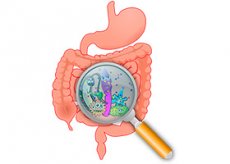New publications
Relationship between bacteria in the gut and cancerous tumor growth in the liver
Last reviewed: 02.07.2025

All iLive content is medically reviewed or fact checked to ensure as much factual accuracy as possible.
We have strict sourcing guidelines and only link to reputable media sites, academic research institutions and, whenever possible, medically peer reviewed studies. Note that the numbers in parentheses ([1], [2], etc.) are clickable links to these studies.
If you feel that any of our content is inaccurate, out-of-date, or otherwise questionable, please select it and press Ctrl + Enter.

Researchers have discovered that bacteria that inhabit the intestines are able to control the growth of cancer in the liver.
Certain varieties of Clostridia suppress the body's own anti-tumor defenses and interfere with the processes of bile acid secretion.
Several years ago, scientists experimentally confirmed that numerous colonies of intestinal microbes influence the quality of antitumor immunity. However, the development of such a mechanism in liver cancer was not observed.
It was unexpected for the researchers that bacteria can control the immune response to primary and metastatic processes. The scientific project was organized by employees of the American National Cancer Institute. The results obtained allowed a new assessment of the development of a cancerous tumor in the liver, as well as a new analysis of the possibility of treating and preventing oncology by monitoring the quality of intestinal flora.
The human digestive system is home to a huge population of bacteria, collectively known as the intestinal microflora. Several million bacterial and fungal colonies have a full impact on human well-being and health. These microorganisms potentiate the immune system's response to pathogens; they participate in digestion and metabolism processes. In liver tissue, for example, the bacterial flora regulates the secretion of bile acids.
Significant changes in the balance of microflora occur during periods of infectious diseases and metabolic disorders.
Scientists note that both primary and metastatic liver tumors are the most common cause of death in American cancer patients. Liver function is largely dependent on the state of the intestines, and by-products of the metabolism of intestinal microorganisms enter the liver through the bloodstream. That's right: the blood flowing from the intestines is approximately 70% of the entire liver blood supply.
During the study, the specialists involved experimental rodents with primary and metastatic liver cancer in the process. Antibiotic therapy, as it turned out, not only led to the suppression of intestinal microflora, but also reduced the size of the tumor. There could be only one conclusion: certain bacteria potentiate the development of cancer.
"We asked ourselves: why did the rodents that were treated with antibiotics "turn on" antitumor immunity, increase the population of NK killers and the production of the protein CXCL16 in endothelial structures? These cells are natural enemies of cancer in the body," explains Tim Greten, one of the authors of the project. The scientists found the answer to this question: bile acids control the expression of CXCL16. Therefore, the composition of bile somehow affects antitumor protection.
At the final stage of the experiment, the specialists also discovered a bacterium that manipulates the immune response. It turned out to be Clostridium, a common microorganism that “lives” inside the intestines of humans and mammals. An increase in the number of Clostridium colonies in the intestinal cavity led to a decrease in the number of NK killers and potentiated the development of cancer.
“Bile mass not only participates in the emulsification and absorption of lipids, but also affects the functionality of the immune system,” one of the experts comments on the discovery.
It is likely that in the future, scientists will work on the possibility of using antibiotic therapy in the fight against cancer processes in the liver.
The results of the study are presented on the pages of Science.

 [
[